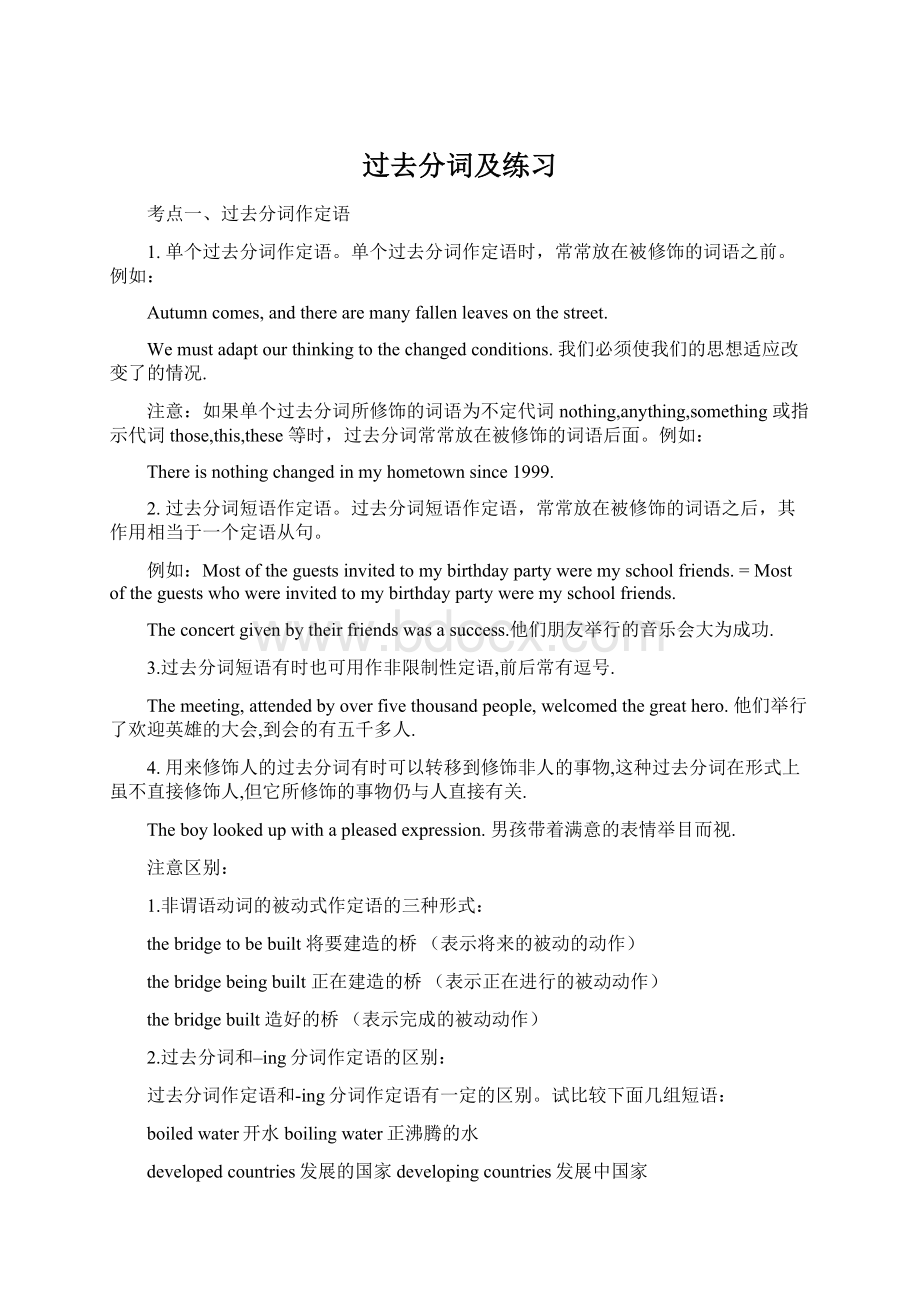过去分词及练习.docx
《过去分词及练习.docx》由会员分享,可在线阅读,更多相关《过去分词及练习.docx(23页珍藏版)》请在冰豆网上搜索。

过去分词及练习
考点一、过去分词作定语
1.单个过去分词作定语。
单个过去分词作定语时,常常放在被修饰的词语之前。
例如:
Autumncomes,andtherearemanyfallenleavesonthestreet.
Wemustadaptourthinkingtothechangedconditions.我们必须使我们的思想适应改变了的情况.
注意:
如果单个过去分词所修饰的词语为不定代词nothing,anything,something或指示代词those,this,these等时,过去分词常常放在被修饰的词语后面。
例如:
Thereisnothingchangedinmyhometownsince1999.
2.过去分词短语作定语。
过去分词短语作定语,常常放在被修饰的词语之后,其作用相当于一个定语从句。
例如:
Mostoftheguestsinvitedtomybirthdaypartyweremyschoolfriends.=Mostoftheguestswhowereinvitedtomybirthdaypartyweremyschoolfriends.
Theconcertgivenbytheirfriendswasasuccess.他们朋友举行的音乐会大为成功.
3.过去分词短语有时也可用作非限制性定语,前后常有逗号.
Themeeting,attendedbyoverfivethousandpeople,welcomedthegreathero.他们举行了欢迎英雄的大会,到会的有五千多人.
4.用来修饰人的过去分词有时可以转移到修饰非人的事物,这种过去分词在形式上虽不直接修饰人,但它所修饰的事物仍与人直接有关.
Theboylookedupwithapleasedexpression.男孩带着满意的表情举目而视.
注意区别:
1.非谓语动词的被动式作定语的三种形式:
thebridgetobebuilt将要建造的桥(表示将来的被动的动作)
thebridgebeingbuilt正在建造的桥(表示正在进行的被动动作)
thebridgebuilt造好的桥(表示完成的被动动作)
2.过去分词和–ing分词作定语的区别:
过去分词作定语和-ing分词作定语有一定的区别。
试比较下面几组短语:
boiledwater开水boilingwater正沸腾的水
developedcountries发展的国家developingcountries发展中国家
fallenleaves落叶fallingleaves正在飘落的叶子
changedcondition改变了的情况changingcondition变化着的情况
由此可见,过去分词作定语通常表示完成的或被动的动作;而-ing分词作定语可以表示正在进行的主动的动作。
考点二、过去分词作表语
1.过去分词用作表语时,通常说明主语所处的状态或感受等。
例如:
InoticedthedoorsandwindowswerelockedwhenIcametoseehim.
Sheseemedterriblyshockeduponhearingthesadnews.
过去分词和–ing分词作表语的区别:
过去分词作表语通常表示主语所处的状态或感受,修饰人;而-ing分词作表语多表示主语所具有的特征,修饰物.
如:
Hearingthenews,wefeltverysurprised.听到那个消息,我们感到很惊讶
Thenewsisverysurprising.这个消息很令人惊讶。
Theywerefrightenedtohearthefrighteningsound.他们听到那可怕的声音很害怕。
Atthesightofthemovingscene,allthepeoplepresentweremovedtotears.看到这么动人的情景,所有在场的人都感动得流下了眼泪。
英语中这样的分词还有很多,如:
amusing,amused;encouraging,encouraged;disappointing,disappointed;exciting,excited;puzzling,puzzled;satisfying,satisfied;worrying,worried;tiring,tired;pleasing,pleased;interesting,interested;astonishing,astonished等。
实战演练:
1.Thewaterinthisglassistoohot.Iprefersomecold_____water.A.toboilB.havingboiledC.boiledD.boiling
2.Theproblemjust________isanimportantone.A.tobereferredtoB.referredtoC.referringtoD.referred
3.——Amanwaskilled.
——Whereisthebodyofthe________man?
A.murderB.murderedC.murderingD.havingmurdered
4.ChinaDaily,first_________in1980,isverypopularwithstudentsofEnglishinChina.
A.publishedB.waspublishedC.havingpublishedD.havingbeenpublished
5.Thegreathallwascrowdedwithmanypeople,________manychildren________ontheirparentslaps.
A.including;seatedB.including;seatingC.including;satD.included;sitting
6.——HowdidBobdointheexamthistime?
——Well,hisfatherseems______withhisresults.A.pleasingB.pleaseC.pleasedD.toplease
7.Pricesofdailygoods_______throughacomputercanbelowerthanstoreprices.
A.areboughtB.boughtC.beenboughtD.buying
8.——What’sthemainpurposeoftonight’smeeting?
——Wearegoingtotalkabouttheproblem_______atthelastmeeting.
A.discussedB.discussingC.beingdiscussedD.havingdiscussed
9.Thefirsttextbooks________forteachingEnglishasaforeignlanguagecameoutinthe16thcentury.
A.havingwrittenB.tobewrittenC.beingwrittenD.written
10.——Howdoyoudealwiththedisagreementbetweenthecompanyandthecustomers?
——Thekey________theproblemistomeetthedemand________bythecustomers.
A.tosolving;makingB.tosolving;madeC.tosolve;makingD.tosolve;made
Key:
1~5CBBAA6~10CBADB
考点三过去分词作宾语补足语
及物动词的过去分词作宾语补足语,表示宾语是过去分词动作的承受者,构成逻辑上的动宾关系。
常见的情况有下列几种:
一、表示“致使”意义的动词。
如:
have,make,get,keep,leave等。
(1)I'llhavemyhaircuttomorrow.明天我要理发。
(2)Hegothistoothpulledoutyesterday.他昨天把牙拔了。
(3)Don'tleavethosethingsundone.要把那些事情做完。
(4)Hemanagedtogetthetaskfinishedontime.他设法按时完成了任务。
注意:
使役动词have接过去分词作宾补有两种情况。
①主语让别人做某事,强调主语的意志。
如:
Hehadhishaircutyesterday.他昨天理发了。
Lateronthecenterhadagreatmanynewtreesplanted.后来,这个中心让人种了很多树。
②主语遭到某种不幸或陷入恶劣的环境,说明宾语的一种无意识的被动行为。
如:
Hehadhislegbrokeninthematchlastmonth.他在上星期的比赛中摔断了腿。
Hehadoneeyelostinthewar.在战争中,他失去了一只眼睛。
【高考链接】
1.JennyhopesthatMr.SmithwillsuggestagoodwaytohaveherwrittenEnglish______inashortperiod.(福建卷)
A.improvedB.improvingC.toimproveD.improve
2.Helenhadtoshout______abovethesoundofthemusic.(全国II卷)
A.makingherselfhearB.tomakeherselfhearC.makingherselfheardD.tomakeherselfheard
二、表示感觉或心理状态的动词.如:
see,watch,observe,lookat,hear,listento,feel,notice,think,find等。
IheardthesongsunginEnglish.我听到有人用英语唱过这首歌。
Hefoundhishometowngreatlychanged.他发现他的家乡变化很大。
Shesawthewoundedmancarriedintothehospital.她看到这个受伤的男人被抬进了医院。
【高考链接】TolearnEnglishwell,weshouldfindopportunitiestohearEnglish______asmuchaswecan.(2008江苏卷)A.speakB.speakingC.spokenD.tospeak
三、表“希望,要求”的动词:
want,wish,expect,wish,like,order+(tobe)done如:
Iwantthework(tobe)finishedbySunday.
Jimorderedtheroom(tobe)cleaned
【高考链接】
Shewantsherpaintings______inthegallery,butwedontthinktheywouldbeverypopular.(上海)
A.displayB.todisplayC.displayingD.displayed
四、with/without+宾语+过去分词,表示伴随情况的独立结构。
如:
Witheverythingtakenintoconsideration,weallthinkthisisaverygoodplan.每件事都考虑到了,我们都认为这是一项不错的计划。
Withdifferentmethodsused,differentresultsareobtained.采用不同的方法,得到不同的结果。
Shewentangrilyawaywithoutawordspoken.她一个字也没说,就生气地走了。
Thedayendedwithnothingsettled.那一天什么也没解决就结束了。
【高考链接】
1.Youhavenoideahowshefinishedtherelayrace_______herfootwoundedsomuch.(2008福建卷)
A.forB.whenC.withD.while
2.Johnreceivedaninvitationtodinner,andwithhiswork_______,hegladlyacceptedit.(2007安徽卷)
A.finishedB.finishingC.havingfinishedD.wasfinished
考点四过去分词作状语
过去分词和-ing分词作状语一样,也可以表示时间、原因、条件、让步、方式或伴随情况等。
①表时间,相当于一个时间状语从句,有时过去分词前可加连词when或while来强调时间概念。
如:
Seenfromthetopofthehill,thecitylookedlikeabiggarden.从山顶上看,这个城市就像一个大花园。
AcceptedbytheParty,hedecidedtodevotehislifetothecauseoftheParty.入党以后,他决定献身于党的事业。
②表原因,相当于一个原因状语从句。
如:
Deeplymovedbythestory,theexcitedpeoplestoppedquarrellingwitheachother.
激动的人们被那个故事深深地感动了,停止了争吵。
Encouragedbythespeech,theyoungpeoplemadeuptheirmindstotakeupthestruggle.
受到了讲演的鼓舞,年轻人决定起来从事斗争。
③表条件,相当于一个条件状语从句,有时过去分词前可用if等词。
如:
Givenanotherchance,hewilldobetter.再给他一次机会,他会做得更好。
Comparedwithyourbrother,youshouldmakegreatereffortstostudyEnglish.和你哥哥相比你应该更加努力学英语。
Ifheated,watercanbeturnedintosteam.水如果被加热,会变成水蒸气。
④表让步,相当于一个though/although引导的让步状语从句。
如:
Exhaustedbytherunning,theywentonrunningaftertherobber.尽管已经跑得筋疲力尽他们还是继续追赶那个强盗。
Laughedatbymanypeople,hecontinuedhisstudy.尽管被许多人嘲笑,他还是继续他的研究。
⑤表方式或伴随情况。
如:
Theoldmanwentintotheroom,supportedbyhiswife.那个老人在他的妻子的搀扶下走进了房间。
Seatedatthetable,myfatherandIweretalkingaboutmyjob.我和父亲坐在桌子旁边讨论着我的工作问题。
过去分词作状语应注意以下几点。
一、过去分词与句子主语之间的关系
(1)过去分词作状语表示被动或完成的动作。
过去分词与句子主语之间通常存在逻辑上的动宾关系。
如:
Growninrichsoil,theseseedscangrowfast.种在肥沃的土壤里,这些种子能长得很快。
【高考链接1】 _____nottomisstheflightat15:
20,themanagersetoutfortheairportinahurry.(2009福建卷)
A.RemindingB.RemindedC.ToremindD.Havingreminded
【答题指导】分词在句子中作状语,分词的逻辑主语与句子的主语一致。
使用何种分词,要取决于分词与句子主语之间的关系:
主谓关系用现在分词,动宾或被动关系用过去分词。
比较:
Seenfromthesky,ourcityisverybeautiful.(ourcity与see之间是被动关系)
Seeingfromthesky,wefindourcityisverybeautiful.(we与see之间是主谓关系)
(2)有些过去分词因来源于系表结构,作状语时不表被动而表主语的状态。
这样的过去分词及短语常见的有:
lost(迷路);seated(坐);hidden(躲);lostin(沉迷于……);dressedin(穿着)。
由某些动词后面加-ed转化来的形容词也具有此用法,如frightened,satisfied,tired,disappointed等。
如:
Surprisedatwhathadhappened,Tomdidn’tknowwhattodo.汤姆对发生的一切非常惊讶,以至于不知如何是好。
【高考链接2】 ______andshortofbreath,AndyandRubywerethefirsttoreachthetopofMountTai.(2009浙江卷)
A.TobetriedB.TiredC.TiringD.Beingtired
二、过去分词作状语所表示的意义
过去分词作状语时表示时间、条件、原因、让步时可转换为相应的状语从句;表示方式、结果和伴随时可转化为并列分句。
如:
Looked(=Ifitislooked)atadistance,thepaintingseemsmuchmorebeautiful.隔着一段距离看,这幅画似乎要漂亮得多。
Thecupfelldowntotheground,broken.=Thecupfelldowntothegroundanditwasbroken.茶杯掉到了地上,碎了。
【高考链接3】____therightkindoftraining,theseteenagesoccerplayersmayonedaygrowintotheinternationalstars.(2009江西卷)A.GivingB.HavinggivenC.TogiveD.Given
【高考链接4】Michael’snewhouseislikeahugepalace,_____withhisoldone.(2009重庆卷)
A.comparingB.comparesC.tocompareD.compared
三、“连词+过去分词”结构
根据主句主语和从句主语一致且从句含有动词be时可省略从句主语和动词be的原则,可把状语从句变换为“连词+过去分词”结构。
常用的连词有if,unless,when,as,once,evenif/eventhough,asif,though/although等。
如:
Iwon’tattendhisbirthdaypartyunlessinvited(=unlessIaminvited).
除非被邀请,否则我不去参加他的生日晚会。
【高考链接5】Everyeveningafterdinner,ifnot____fromwork,Iwillspendsometimewalkingmydog.(2009湖南卷)A.beingtiredB.tiringC.tiredD.tobetired
四、独立主格结构
由一个名词或代词作为逻辑主语,加上一个分词、形容词、副词、动词不定式或介词短语作为逻辑谓语构成,这种结构在形式上与主句没有关系,通常被称为独立主格结构。
(一)独立主格结构的构成:
名词(代词)+名词
名词(代词)+现在分词
名词(代词)+过去分词
名词(代词)+形容词
名词(代词)+副词
名词(代词)+不定式
名词(代词)+介词短语构成
独立主格结构主要起状语作用,相当于一个状语从句,多用来表示行为、方式、伴随等情况,有时也可用来表示时间、原因、条件等情况。
1、名词或代词主格+现在分词
Wintercoming,itgetscolderandcolder.=Thewintercomes,anditgetscolderandcolder.
Thegirlstaringathim,hedidn’tknowwhattosay.=Asthegirlstaredathim,hedidn’tknowwhattosay
Timepermitting,wecanhaveawalkaroundtheplaygroundaftersupper.
2.名词或代词主格+过去分词
Theexperimentdone,thestudentswentontotakenotesintheexperimentreport.
实验做完了,同学们继续在实验报告上做记录。
Hewaslisteningattentivelyinclass,hiseyesfixed